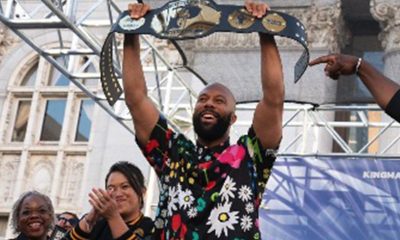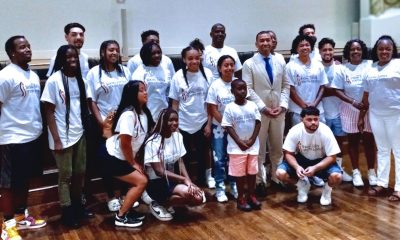Entertainment
After the Oscars, Diversity Remains a Topic of Discussion

Common, left, and John Legend pose in the press room with the award for best original song in a feature film for Glory from Selma at the Oscars on Sunday, Feb. 22, 2015, at the Dolby Theatre in Los Angeles. (Photo by Jordan Strauss/Invision/AP)
DAVID BAUDER, AP Television Writer
NEW YORK (AP) — What was missing from the Academy Awards turned out to be the issue that could not be ignored on the night trophies were handed out.
The lack of non-white contenders for major acting awards this year became a focus on the day Oscar nominations were announced. Hollywood’s commitment to reflecting the nation’s diversity, and its sensitivity to how these issues are perceived, could not be missed on Sunday’s show — from the opening joke on.
___
BEST AND WHITEST
Host Neil Patrick Harris put it right on the table. “Tonight, we honor Hollywood’s best and whitest — excuse me, brightest,” he said.
It drew a knowing laugh, and no small amount of parsing.
Was Harris tweaking Hollywood for an embarrassing shortcoming? Or was he making fun of the people who have raised it as an issue of concern?
Obviously, the Oscars are an entertainment program and hosts are expected to make jokes, said Eric Haywood, a writer on Fox’s hit drama “Empire.” Yet jokes can also make people feel that their concerns are not being taken seriously, he said.
“As it stands, the joke is likely to be reduced to a meme, which the Academy is in no way obligated to address and can easily dismiss,” said Robert Jones, a Brooklyn writer and creator of the social justice blog, Son of Baldwin. “It is, after all, just a joke, right?”
___
“SELMA” STAR
Another knowing line from Harris came when he praised actor David Oyelowo, who played Martin Luther King Jr. in the movie “Selma” but was passed over for an acting nomination. Harris asked Oyelowo to stand and the audience applauded.
“Oh, sure,” Harris said. “Now you like him.”
Oyelowo was arguably involved in the emotional high point of the show. The movie’s anthem, “Glory,” by Common and John Legend, won the Oscar for best song shortly after the two musicians performed it. A camera cut to Oyelowo as the song was being sung and his face was stained with tears.
___
BOYCOTT
Haywood saw references to Oscar moments on Twitter Sunday night but had no personal knowledge of them. He wasn’t watching. Being in the entertainment business, he usually tunes in. This year, he participated in a boycott of the Oscars ceremony by some black viewers that was organized through the Twitter hashtag #OscarsSoWhite.
That hashtag appears to have been started by a friend of Haywood’s, Washington lawyer April Reign, according to Twitter, and was the gathering place for a steady stream of commentary on Hollywood’s lack of diversity.
There have been some 140,000 mentions of the hashtag since the day nominations were announced, according to Topsy. The number of mentions peaked that day and the hashtag became popular again Sunday night.
The Sunday night audience of 36.6 million people was down 16 percent from the 43.7 million viewers who watched in 2014, the Nielsen company said. Nielsen had no immediate breakdown of Oscar viewership by ethnicity.
Haywood said he was glad the issue was brought to the fore.
“Change comes very slowly,” he said. “I don’t expect any sort of radical change to the status quo from one year to the next. My hopes are not too high for anything to happen too quickly. By the same token, it doesn’t hurt for people to raise their voices.”
___
NON-NOMINATED MINORITIES
To some viewers, the Academy Awards made it a specific point to emphasize diversity during the show, from Harris noting Oyelowo in the audience to making Oprah Winfrey a joke target.
Nowhere was the effort more evident than in the awards presenters, who included Terrence Howard, Kerry Washington, Viola Davis, Winfrey, Oyelowo, Chiwetel Ejiofor, Idris Elba, Kevin Hart, Eddie Murphy, Lupita Nyong’o, Zoe Saldana and Octavia Spencer.
___
ARQUETTE BACKLASH
Meryl Streep stood and cheered when Patricia Arquette, in her acceptance speech for best supporting actress award, made a ringing declaration in favor of equal rights and pay for women.
Her elaboration backstage, however, struck some who heard about it as pitting groups against each other.
“It’s time for all the women in America and all the men that love women, and all the gay people, and all the people of color that we’ve fought for to fight for us now,” Arquette said backstage, leading some critics to wonder if her call for wage equality was for white women only.
___
LOCK BOX
Harris’ assignment of actress Octavia Spencer to watch the “lock box” of his Oscars prediction struck some people online as demeaning: Even as a joke, assigning a black woman to the task, supervised by two white actors, may have been tone deaf. A spokeswoman for Spencer did not immediately return a request for comment on Monday.
___
PENN AND INARRITU
The line, coming from one of Hollywood’s most prominent liberals, seemed shocking.
“Who gave this son of a bitch his green card,” actor Sean Penn said, announcing the win for “Birdman” as best picture, directed by Mexican-born Alejandro Inarritu.
A slur? No, Inarritu said backstage that he and Penn are friends and the reference to the document that confers residency status to immigrants was an example of the rough sense of humor they share. “I found it hilarious,” he said.
All’s good, said Penn’s publicist, Mara Buxbaum, on Monday.
“As Inarritu said, they are indeed great friends,” she said. “Sean Penn is currently in Haiti with President Clinton. He is not available for an interview.”
____
Lynn Elber and Sandra Cohen in Los Angeles contributed to this report.
Copyright 2015 The Associated Press. All rights reserved. This material may not be published, broadcast, rewritten or redistributed.
Activism
Oakland Post: Week of December 25 – 31, 2024
The printed Weekly Edition of the Oakland Post: Week of December 25 – 31, 2024

To enlarge your view of this issue, use the slider, magnifying glass icon or full page icon in the lower right corner of the browser window.
Black History
Ashleigh Johnson: Pioneering the Way in Water Polo
Ashleigh Johnson attended Princeton University, where she played for the Tigers and dominated collegiate water polo. During her time at Princeton, she became the program’s all-time leader in saves and was recognized for her extraordinary ability to anticipate plays and block shots. She was a three-time All-American and was pivotal in leading her team to multiple victories. Balancing rigorous academics and athletics, she graduated with a degree in Psychology, showcasing her determination both in and out of the pool.

By Tamara Shiloh
Ashleigh Johnson has become a household name in the world of water polo, not only for her incredible athleticism and skill but also for breaking barriers as the first Black woman to represent the United States in the sport at the Olympic level. Her journey begins as a determined young athlete to a record-breaking goalkeeper.
Born on September 12, 1994, in Miami, Florida, Ashleigh grew up in a family that valued sports and academics. She attended Ransom Everglades School, where she was introduced to water polo. Despite water polo being a niche sport in her community, she quickly stood out for her remarkable agility, intelligence, and reflexes. Her unique skill set made her a natural fit for the demanding role of a goalkeeper.
Ashleigh attended Princeton University, where she played for the Tigers and dominated collegiate water polo. During her time at Princeton, she became the program’s all-time leader in saves and was recognized for her extraordinary ability to anticipate plays and block shots. She was a three-time All-American and was pivotal in leading her team to multiple victories. Balancing rigorous academics and athletics, she graduated with a degree in Psychology, showcasing her determination both in and out of the pool.
In 2016, Ashleigh made history as the first Black woman to be selected for the U.S. Olympic Water Polo Team. Representing her country at the Rio Olympics, she played a crucial role in helping Team USA secure the gold medal. Her stellar performances earned her the distinction of being named the tournament’s top goalkeeper, further cementing her status as one of the best players in the sport’s history.
Ashleigh didn’t just stop at one Olympic appearance. She continued her dominance in water polo, playing a key role in Team USA’s gold medal win at the 2020 Tokyo Olympics. Her ability to remain composed under pressure and deliver outstanding saves in crucial moments made her an irreplaceable member of the team.
At the age of 29, Johnson appeared in her third Olympiad in Paris at the 2024 Summer Olympics. Their first match was against Greece and the US team won easily and Johnson only gave up 4 points. U.S. Olympic head coach Adam Krikorian shared, “She’s an incredible athlete. She’s got great hand-eye coordination, great reflexes and reactions. And then she’s fiercely competitive – fiercely. And you would never know it by her demeanor or by the huge smile on her face. But to us, on the inside, we know how driven she is to be one of the best ever to do it.”
Team USA Women’s Water Polo ended their Olympic season in fourth place after a 10 – 11 loss to the Netherlands. Johnson only allowed 37 percent of the shots from the Netherlands.
Beyond her achievements in the pool, Ashleigh has used her platform to advocate for diversity in water polo and sports in general. As a trailblazer, she recognizes the importance of representation and works to encourage young athletes, particularly those from underrepresented backgrounds, to pursue their dreams.
Ashleigh has spoken about the challenges she faced as a Black woman in a predominantly white sport and how she turned those obstacles into opportunities for growth.
Arts and Culture
In ‘Affrilachia: Testimonies,’ Puts Blacks in Appalacia on the Map

By Terri Schlichenmeyer
The Bookworm Sez
An average oak tree is bigger around than two people together can reach.
That mighty tree starts out with an acorn the size of a nickel, ultimately growing to some 80 feet tall, with a canopy of a hundred feet or more across.
And like the new book, “Affrilachia” by Chris Aluka Berry (with Kelly Elaine Navies and Maia A. Surdam), its roots spread wide and wider.
Affriclachia is a term a Kentucky poet coined in the 1990s referring to the Black communities in Appalachia who are similarly referred to as Affrilachians.
In 2016, “on a foggy Sunday morning in March,” Berry visited Affrilachia for the first time by going the Mount Zion AME Zion Church in Cullowhee, North Carolina. The congregation was tiny; just a handful of people were there that day, but a pair of siblings stood out to him.
According to Berry, Ann Rogers and Mae Louise Allen lived on opposite sides of town, and neither had a driver’s license. He surmised that church was the only time the elderly sisters were together then, but their devotion to one another was clear.
As the service ended, he asked Allen if he could visit her. Was she willing to talk about her life in the Appalachians, her parents, her town?
She was, and arrangements were made, but before Barry could get back to Cullowhee, he learned that Allen had died. Saddened, he wondered how many stories are lost each day in mountain communities where African Americans have lived for more than a century.
“I couldn’t make photographs of the past,” he says, “but I could document the people and places living now.”
In doing so he also offers photographs that he collected from people he met in ‘Affrilachia,’ in North Carolina, Georgia, Kentucky, and Tennessee, at a rustic “camp” that was likely created by enslaved people, at churches, and in modest houses along highways.
The people he interviewed recalled family tales and community stories of support, hardship, and home.
Says coauthor Navies, “These images shout without making a sound.”
If it’s true what they say about a picture being worth 1,000 words, then “Affrilachia,” as packed with photos as it is, is worth a million.
With that in mind, there’s not a lot of narrative inside this book, just a few poems, a small number of very brief interviews, a handful of memories passed down, and some background stories from author Berry and his co-authors. The tales are interesting but scant.
For most readers, though, that lack of narrative isn’t going to matter much. The photographs are the reason why you’d have this book.
Here are pictures of life as it was 50 years or a century ago: group photos, pictures taken of proud moments, worn pews, and happy children. Some of the modern pictures may make you wonder why they’re included, but they set a tone and tell a tale.
This is the kind of book you’ll take off the shelf, and notice something different every time you do. “Affrilachia” doesn’t contain a lot of words, but it’s a good choice when it’s time to branch out in your reading.
“Affrilachia: Testimonies,” by Chris Aluka Berry with Kelly Elaine Navies and Maia A. Surdam
c.2024, University of Kentucky Press, $50.00.
-

 Activism4 weeks ago
Activism4 weeks agoOakland Post: Week of November 27 – December 3, 2024
-

 Activism3 weeks ago
Activism3 weeks agoButler, Lee Celebrate Passage of Bill to Honor Congresswoman Shirley Chisholm with Congressional Gold Medal
-

 Activism3 weeks ago
Activism3 weeks agoPost News Group to Host Second Town Hall on Racism, Hate Crimes
-

 Activism3 weeks ago
Activism3 weeks agoDelta Sigma Theta Alumnae Chapters Host World AIDS Day Event
-

 Business3 weeks ago
Business3 weeks agoLandlords Are Using AI to Raise Rents — And California Cities Are Leading the Pushback
-

 Arts and Culture2 weeks ago
Arts and Culture2 weeks agoPromise Marks Performs Songs of Etta James in One-Woman Show, “A Sunday Kind of Love” at the Black Repertory Theater in Berkeley
-

 Activism3 weeks ago
Activism3 weeks agoOakland Post: Week of December 4 – 10, 2024
-

 Activism2 weeks ago
Activism2 weeks agoOakland Post: Week of December 11 – 17, 2024






























































